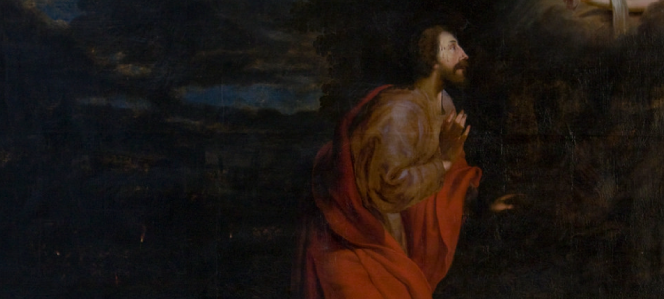“For we do not have a high priest who is unable to sympathize with our weakness, but one who has similarly been tested in every way, yet without sin.” Hebrews 4:15
During Holy Week of 2017, I found myself thinking a lot about the desires of Jesus. In the Garden of Gethsemane, St. Matthew tells us that Jesus prayed, “My Father, let this cup pass from me; yet, not as I will, but as you will,” not once, but three times. I’ve been wondering about the will of Jesus, as his words indicate that on some level, he desired something other than the impending cross. We know that Jesus never sinned. And we know that he ultimately aligned his will to that of his Father, accepted the cross, and saved us from sin. But we also know that such obedience wasn’t cheap or easy. It was agony, according to Scripture.
When one of my seminarians is struggling in his priestly discernment and tells me that he has strong desires for a wife and children, I often shake his hand and congratulate him for his honesty and for having such desires, as they are God-given and natural, and they do not necessarily mean that he isn’t called to the priesthood. In fact, I often worry about a man who is studying for the priesthood who has no desire for a wife and children. There is nothing sinful about such desires, and, to be candid, even after almost fifteen joyful years of being a priest, from time to time I still long for the marital embrace and a family of my own. And I’ve got a lot of very good priest friends who have shared with me the same natural desires.
So if Jesus is like us in all things but sin, and if a man’s natural desire for a wife and children is not sinful, might it be that Jesus himself experienced some of those very natural desires? Keep in mind that desires are not actions, and I’m not talking about lustful or inordinate desire here; I’m simply talking about the natural human desire of a man for a woman and for the begetting of children. And I’m wondering if Jesus experienced such desire, specifically in the Garden of Gethsemane.
In 1988 Martin Scorsese made the film The Last Temptation of Christ, which was met with heavy criticism by many of the faithful. A majority of the controversy involved a scene that presented a vision of what Jesus’ life could be if he were to choose not die on the cross in obedience to his Father. The imagined life depicted Jesus happily married to Mary Magdalene. I understand why images of our Lord in bed with Mary Magdalene upset so many of the faithful—they are hard to watch, but I also think that many of the faithful forgot what they were watching, if they watched at all, namely, a dream sequence. After all, Scorsese’s Christ chose the cross and not Mary Magdalene.
A few years ago Bruce Springsteen offered a similar commentary during his Devils and Dust tour while playing “Jesus Was an Only Son” on his piano. (You can find it on YouTube.) Between the second and third verse Springsteen preaches:
“The choices that we make are given their value by the things we give up for them—the parts of life that we pass by. He (Jesus) had to be thinking, ‘Gee, Galilee is pretty nice this time of year. There’s a little bar. I could manage it. Mary Magdalene could tend bar. I could do the preaching on the weekend, and have some kids. Get to watch the sun on their face. Get to feel the breath in their lungs.’”
Then Springsteen heads right into the next verse, singing, “In the Garden of Gethsemane, he prayed for the life he’d never live. He beseeched his heavenly Father to remove the cup of death from his lips.” Just like Scorsese’s narrative, Springsteen’s Jesus experiences some very natural human desires for a wife and children, but he ultimately chooses the cross in obedience to his Father’s will.
I don’t know whether or not Jesus ever had any desire to marry Mary Magdalene or any other woman for that matter. But if he did, I do know that such a desire would not be sinful, but natural. I also know that the call to celibacy is supernatural, and that if you’re called to the life of celibacy, only celibate love will satisfy you, no matter what kinds of desires you experience on the natural level.
There’s a part of me that hopes that Jesus did experience a real desire for marriage and family. If he ever seriously considered what life might look like if he married Mary Magdalene or some other woman, my Lord, that brings me great comfort. Why? Because it would mean that my Savior, the high priest Jesus Christ, was truly tested in every way, yet never sinned. It would mean that he would know firsthand the experience of so many of his priests and seminarians. And it would give all of us great confidence that Jesus Christ himself experienced all the natural desires that we experience for wife and family, yet he renounced them, as good as they are, because the Father had another plan for him. And that plan was to bring salvation to God’s people. That plan was for Jesus to marry not one woman, but to marry the human race. That plan had eternal consequences. And if Jesus was able to sacrifice some very deep, natural, God-given desires for the sake of the kingdom, it must be possible for his priests and seminarians to do the same. And through the power of the Holy Spirit, he’ll give us the strength to do it, as he’s already given us the witness.
That’s what I was thinking about last Holy Week.
